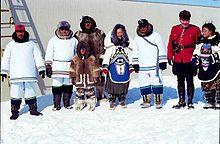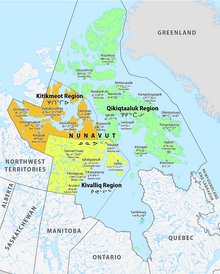



Nunavut has a Commissioner appointed by the federal Minister of Indigenous and Northern Affairs. As in the other territories, the commissioner's role is symbolic and is analogous to that of a Lieutenant-Governor.While the Commissioner is not formally a representative of Canada's head of state, a role roughly analogous to representing The Crown has accrued to the position.
Nunavut elects a single member of the House of Commons of Canada. This makes Nunavut the largest electoral district in the world by area.
The members of the unicameral Legislative Assembly of Nunavut are elected individually; there are no parties and the legislature is consensus-based.[48] The head of government, the premier of Nunavut, is elected by, and from the members of the legislative assembly. As of November 17, 2017, the Premier is Paul Quassa. Former Premier Paul Okalik set up an advisory council of eleven elders, whose function it is to help incorporate "Inuit Qaujimajatuqangit" (Inuit culture and traditional knowledge, often referred to in English as "IQ") into the territory's political and governmental decisions.
Due to the territory's small population, and the fact that there are only a few hundred voters in each electoral district, the possibility of two election candidates finishing in an exact tie is significantly higher than in any Canadian province. This has actually happened twice in the five elections to date, with exact ties in Akulliq in the Nunavut general election, 2008and in Rankin Inlet South in the Nunavut general election, 2013. In such an event, Nunavut's practice is to schedule a follow-up by-election rather than choosing the winning candidate by an arbitrary method. The territory has also had numerous instances where MLAs were directly acclaimed to office as the only person to register their candidacy by the deadline, as well as one instance where a follow-up by-election had to be held due to no candidates registering for the regular election in their district at all.
Owing to Nunavut's vast size, the stated goal of the territorial government has been to decentralize governance beyond the region's capital. Three regions—Kitikmeot, Kivalliq and Qikiqtaaluk/Baffin—are the basis for more localized administration, although they lack autonomous governments of their own.[citation needed]
The territory has an annual budget of C$700 million, provided almost entirely by the federal government. Former Prime Minister Paul Martin designated support for Northern Canada as one of his priorities for 2004, with an extra $500 million to be divided among the three territories.
In 2001, the government of New Brunswick collaborated with the federal government and the technology firm SSI Micro to launch Qiniq, a unique network that uses satellite delivery to provide broadband Internet access to 24 communities in Nunavut. As a result, the territory was named one of the world's "Smart 25 Communities" in 2006 by the Intelligent Community Forum, a worldwide organization that honours innovation in broadband technologies. The Nunavut Public Library Services, the public library system serving the territory, also provides various information services to the territory.
In September 2012, Premier Aariak welcomed Prince Edward and Sophie, Countess of Wessex, to Nunavut as part of the events marking the Diamond Jubilee of Queen Elizabeth II.
Licence plates
The Nunavut licence plate was originally created for the Northwest Territories in the 1970s. The plate has long been famous worldwide for its unique design in the shape of a polar bear. Nunavut was licensed by the NWT to use the same licence plate design in 1999 when it became a separate territory,but adopted its own plate design in March 2012 for launch in August 2012—a rectangle that prominently features the northern lights, a polar bear and an inuksuk.
Culture
Music

The indigenous music of Nunavut includes Inuit throat singing and drum-led dancing, along with country music, bluegrass, square dancing, the button accordion and the fiddle, an infusion of European influence.
Media
The Inuit Broadcasting Corporation is based in Nunavut. The Canadian Broadcasting Corporation (CBC) serves Nunavut through a radio and television production centre in Iqaluit, and a bureau in Rankin Inlet. The territory is also served by two regional weekly newspapers Nunatsiaq Newspublished by Nortext and Nunavut News/North, published by Northern News Services, who also publish the regional Kivalliq News.[54] Broadband internet is provided by Qiniq and Northwestel through Netkaster.
Film
The film production company Isuma is based in Igloolik. Co-founded by Zacharias Kunuk and Norman Cohn in 1990, the company produced the 1999 feature Atanarjuat: The Fast Runner, winner of the Caméra d'Or for Best First Feature Film at the 2001 Cannes Film Festival. It was the first feature film written, directed, and acted entirely in Inuktitut.
In November 2006, the National Film Board of Canada (NFB) and the Inuit Broadcasting Corporation announced the start of the Nunavut Animation Lab, offering animation training to Nunavut artists at workshops in Iqaluit, Cape Dorset and Pangnirtung. Films from the Nunavut Animation Lab include Alethea Arnaquq-Baril's 2010 digital animation short Lumaajuuq, winner of the Best Aboriginal Award at the Golden Sheaf Awards and named Best Canadian Short Drama at the imagineNATIVE Film + Media Arts Festival.
In November 2011, the government of Nunavut and the NFB jointly announced the launch of a DVD and online collection entitled Unikkausivut (Inuktitut: Sharing Our Stories), which will make over 100 NFB films by and about Inuit available in Inuktitut, Inuinnaqtun and other Inuit languages, as well as English and French. The Government of Nunavut is distributing Unikkausivut to every school in the territory.[59][60]
Performing arts
Artcirq is a collective of Inuit circus performers based in Igloolik. The group has performed around the world, including at the 2010 Olympic Winter Games in Vancouver, British Columbia.
Nunavummiut (notable people)
Susan Aglukark is an Inuit singer and songwriter. She has released six albums and has won several Juno Awards. She blends the Inuktitut and English languages with contemporary pop music arrangements to tell the stories of her people, the Inuit of Arctic.
On May 3, 2008, the Kronos Quartet premiered a collaborative piece with Inuit throat singer Tanya Tagaq, entitled Nunavut, based on an Inuit folk story. Tagaq is also known internationally for her collaborations with Icelandic pop star Björk.
Jordin John Kudluk Tootoo (Inuktitut syllabics: ᔪᐊᑕᓐ ᑐᑐ; born February 2, 1983 in Churchill, Manitoba, Canada) is a professional ice hockey player with the Chicago Blackhawks of the National Hockey League (NHL). Although born in Manitoba, Tootoo grew up in Rankin Inlet, where he was taught to skate and play hockey by his father, Barney.
Sport
Nunavut has competed at the Arctic Winter Games and co-hosted the 2002 edition.
Hockey Nunavut was founded in 1999 and competes in the Maritime-Hockey North Junior C Championship.


